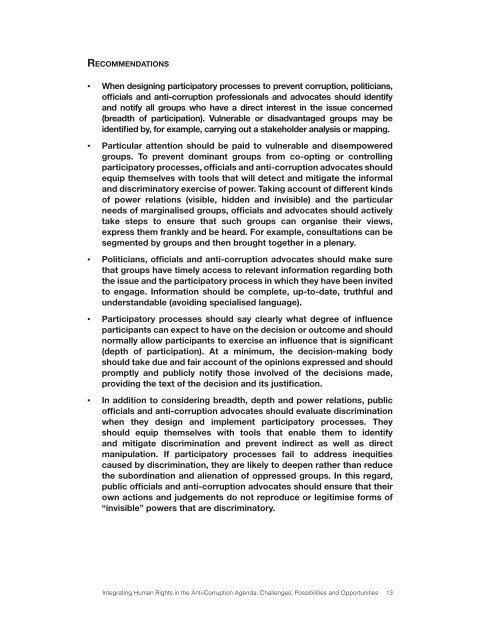Integrating Human Rights in the Anti-Corruption Agenda - The ICHRP
Integrating Human Rights in the Anti-Corruption Agenda - The ICHRP
Integrating Human Rights in the Anti-Corruption Agenda - The ICHRP
You also want an ePaper? Increase the reach of your titles
YUMPU automatically turns print PDFs into web optimized ePapers that Google loves.
Recommendations<br />
▪<br />
▪<br />
▪<br />
▪<br />
▪<br />
When design<strong>in</strong>g participatory processes to prevent corruption, politicians,<br />
officials and anti-corruption professionals and advocates should identify<br />
and notify all groups who have a direct <strong>in</strong>terest <strong>in</strong> <strong>the</strong> issue concerned<br />
(breadth of participation). Vulnerable or disadvantaged groups may be<br />
identified by, for example, carry<strong>in</strong>g out a stakeholder analysis or mapp<strong>in</strong>g.<br />
Particular attention should be paid to vulnerable and disempowered<br />
groups. To prevent dom<strong>in</strong>ant groups from co-opt<strong>in</strong>g or controll<strong>in</strong>g<br />
participatory processes, officials and anti-corruption advocates should<br />
equip <strong>the</strong>mselves with tools that will detect and mitigate <strong>the</strong> <strong>in</strong>formal<br />
and discrim<strong>in</strong>atory exercise of power. Tak<strong>in</strong>g account of different k<strong>in</strong>ds<br />
of power relations (visible, hidden and <strong>in</strong>visible) and <strong>the</strong> particular<br />
needs of marg<strong>in</strong>alised groups, officials and advocates should actively<br />
take steps to ensure that such groups can organise <strong>the</strong>ir views,<br />
express <strong>the</strong>m frankly and be heard. For example, consultations can be<br />
segmented by groups and <strong>the</strong>n brought toge<strong>the</strong>r <strong>in</strong> a plenary.<br />
Politicians, officials and anti-corruption advocates should make sure<br />
that groups have timely access to relevant <strong>in</strong>formation regard<strong>in</strong>g both<br />
<strong>the</strong> issue and <strong>the</strong> participatory process <strong>in</strong> which <strong>the</strong>y have been <strong>in</strong>vited<br />
to engage. Information should be complete, up-to-date, truthful and<br />
understandable (avoid<strong>in</strong>g specialised language).<br />
Participatory processes should say clearly what degree of <strong>in</strong>fluence<br />
participants can expect to have on <strong>the</strong> decision or outcome and should<br />
normally allow participants to exercise an <strong>in</strong>fluence that is significant<br />
(depth of participation). At a m<strong>in</strong>imum, <strong>the</strong> decision-mak<strong>in</strong>g body<br />
should take due and fair account of <strong>the</strong> op<strong>in</strong>ions expressed and should<br />
promptly and publicly notify those <strong>in</strong>volved of <strong>the</strong> decisions made,<br />
provid<strong>in</strong>g <strong>the</strong> text of <strong>the</strong> decision and its justification.<br />
In addition to consider<strong>in</strong>g breadth, depth and power relations, public<br />
officials and anti-corruption advocates should evaluate discrim<strong>in</strong>ation<br />
when <strong>the</strong>y design and implement participatory processes. <strong>The</strong>y<br />
should equip <strong>the</strong>mselves with tools that enable <strong>the</strong>m to identify<br />
and mitigate discrim<strong>in</strong>ation and prevent <strong>in</strong>direct as well as direct<br />
manipulation. If participatory processes fail to address <strong>in</strong>equities<br />
caused by discrim<strong>in</strong>ation, <strong>the</strong>y are likely to deepen ra<strong>the</strong>r than reduce<br />
<strong>the</strong> subord<strong>in</strong>ation and alienation of oppressed groups. In this regard,<br />
public officials and anti-corruption advocates should ensure that <strong>the</strong>ir<br />
own actions and judgements do not reproduce or legitimise forms of<br />
“<strong>in</strong>visible” powers that are discrim<strong>in</strong>atory.<br />
<strong>Integrat<strong>in</strong>g</strong> <strong>Human</strong> <strong>Rights</strong> <strong>in</strong> <strong>the</strong> <strong>Anti</strong>-<strong>Corruption</strong> <strong>Agenda</strong>: Challenges, Possibilities and Opportunities 13

















